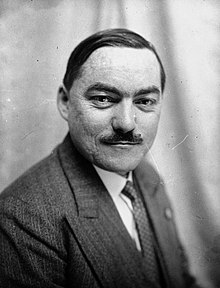Marcel Déat
Marcel Déat | |
|---|---|
 Déat in 1932 | |
| Minister of Air | |
| In office 24 January 1936 – 4 June 1936 | |
| Prime Minister | Albert Sarraut |
| Preceded by | Victor Denain |
| Succeeded by | Pierre Cot |
| Member of the French Chamber of Deputies | |
| In office 1939 – 10 July 1940 | |
| Constituency | Charente |
| In office 9 May 1932 – 3 May 1936 | |
| Constituency | Seine |
| In office 1926 – 29 April 1928 | |
| Constituency | Marne |
| Personal details | |
| Born | 7 March 1894 École Normale Supérieure |
| Profession | Journalist, writer |
This article includes a list of general references, but it lacks sufficient corresponding inline citations. (February 2008) |
Marcel Déat (French pronunciation:
Early life and politics
Marcel Déat was raised in a modest environment, which shared
While he attended the ENS and worked to get a philosophy degree, World War I broke out. He joined the
During the 1920 Tours Congress in which a majority of the SFIO decided to spin off to found the French Communist Party, Marcel Déat positioned himself at the right wing of the SFIO, taking part in the groupe de la Vie socialiste current, alongside Pierre Renaudel.
Déat was elected municipal counsellor of Rheims in 1925, and then deputy for the Marne during a partial election in 1926. However, he lost his seat after the 1928 elections. In these times, Léon Blum, the leader of the SFIO, tried to favor youths in the party, and decided to name Déat secretary of the SFIO parliamentary group. After having been put in charge of the documentary center of the ENS by Célestin Bouglié, Déat now founded a documentary center for the SFIO deputies.
Neo-Socialist period
Marcel Déat published in 1930 Perspectives socialistes (Socialist Perspectives), a
During the
The expelled faction was a minority in the SFIO, but represented the majority of the SFIO parliamentary group. They were opposed both by the left wing of the SFIO, represented by Marceau Pivert, and by the SFIO's center, headed by Blum. The Neosocialists wanted to "reinforce the state against the economic crisis", open themselves to the middle classes and participate in non-Socialist governments.
Without the support of the Socialists, Déat lost his seat in the Chamber. Two years later, he joined the Socialist Republican Union (USR). He became Minister of Air in the "bourgeois" government of Albert Sarraut (Radical) but he quickly resigned his post over disputes with the Prime Minister. With the increasing threats represented by Nazi Germany, Déat wanted to maintain peace at any cost.
He returned to the Chamber of Deputies
Collaborationism
A strong supporter of Germany's occupation of northern France in 1940, Déat took up residence in unoccupied France, and was initially a supporter of Philippe Pétain. He attempted to create a single party to fully realize the aims of the "Révolution nationale", the official, reactionary ideology of Vichy. Thereafter, he founded in February 1941 the National Popular Rally (RNP) which advocated Collaboration with Nazi Germany and antisemitism.[5]
When the
Déat also founded, along with fellow Collaborationists
While reviewing troops from the LVF with former Prime Minister
Exile
After the
See also
References
- S2CID 159675101.
- Hachette, 1987 (in French)
- ISBN 978-1-4128-3404-9.
- ISBN 978-1-4094-0625-9.
- JSTOR 40106890.
- ISSN 0362-4331. Retrieved 7 December 2018.
Works
- Marcel Déat, Perspectives socialistes (Paris, Valois, 1930)
- Max Bonnafous – Marcel Déat – Adrien Marquet – Barthélémy Montagnon, Néo-socialisme ? Ordre, autorité, nation, Paris, Grasset, 140 pages, 1933. Speech pronounced at the SFIO Congress of July 1933.
- Le Plan français : doctrine et plan d'action, Comité du Plan, Paris, Fasquelle, 199 pages, 1936. Preface by Marcel Déat.
- Marcel Déat, De la fausse collaboration à la vraie révolution, décembre 1941-janvier 1942, Paris, Radio-Paris(5 January 1942).
- Marcel Déat, Le Parti unique, Paris, Aux Armes de France, 183 pages, 1943. Articles published in L'Œuvre(18 July – 4 September 1942).
- Dominique Sordet (ed.), Le Coup du 13 décembre, Paris, impr. de Guillemot et de Lamothe, 47 pages, 1943. Article by Marcel Déat : "Il faut les chasser".
- Marcel Déat, Mémoires politiques, Paris, Denoël, 990 pages, 1989. Introduction & notes by Laurent Theis; epilogue by Hélène Déat.
- Marcel Déat, Discours, articles et témoignages, Coulommiers, Éd. Déterna, " Documents pour l'histoire ", 149 pages, 1999.
Further reading
- Reinhold Brender, Kollaboration in Frankreich im Zweiten Weltkrieg. Marcel Déat und das Rassemblement National Populaire, (Studien zur Zeitgeschichte, vol. 38), Munich, R. Oldenbourg Verlag, 338 pages, 1992.[1]
- Philippe Burrin, La Dérive fasciste. Doriot, Déat, Bergery 1933–1944, Paris, Editions du Seuil, 530p, 1986 (Pocket edition with a new preface, 2003).
- Jean-Paul Cointet, Marcel Déat : du socialisme au national-socialisme, Paris, Perrin, 418 pages, 1998.
